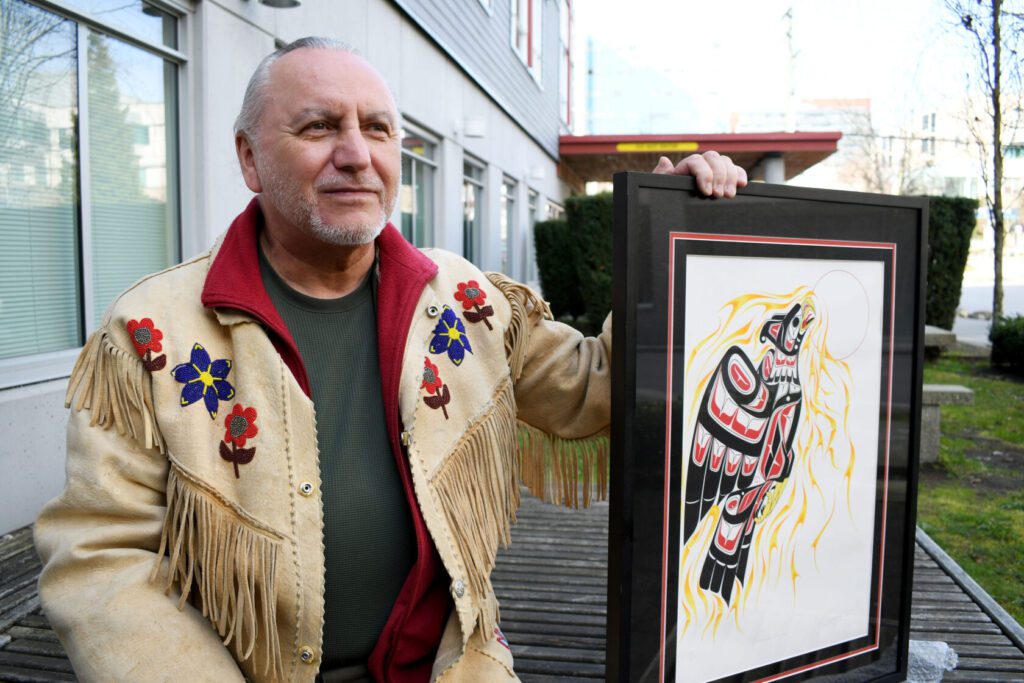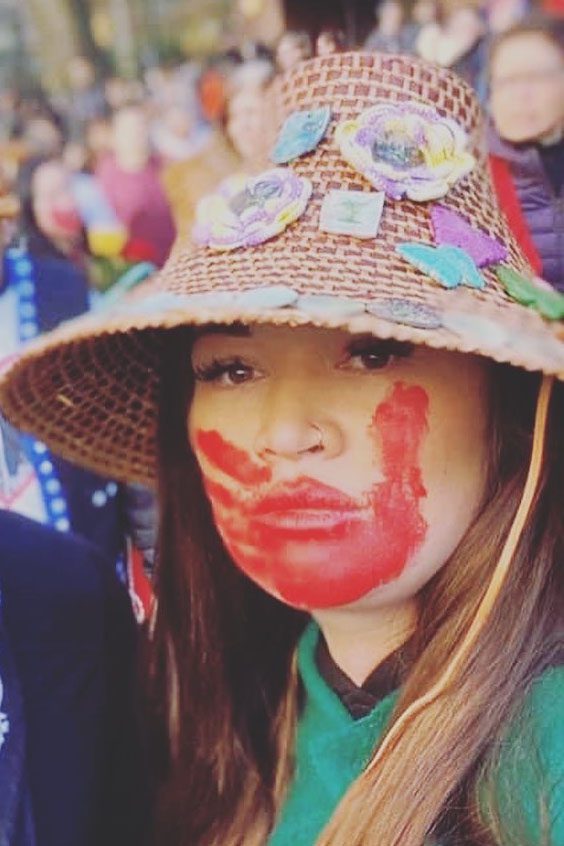 Charles Ayotte carefully places buffalo sage inside an abalone shell, preparing for a cleansing ceremony at the sweat lodge at Phoenix Society’s main campus in Surrey.
Charles Ayotte carefully places buffalo sage inside an abalone shell, preparing for a cleansing ceremony at the sweat lodge at Phoenix Society’s main campus in Surrey.
Using no more than four wooden matches, he prays prior to lighting the sage to focus on the intent of asking the sage medicine for assistance.
“When the sage is lit I clear all my internal ‘chatter’ so as to be present in the moment,” says the Cree Elder, who has served as Phoenix’s Culture & Engagement Lead since 2019. “It’s rather like a meditative state that Eastern philosophies refer to.”
“It is important to not have my wishes and desires interfere with the work that the sage is doing, essentially by becoming a conduit through which the medicines can do the work. The ashes are kept in a container to be placed in a fire to complete the process of sending up the prayers to the Skyworld.”
Charles was holding this ceremony in the wake of the horrific news breaking of 215 childrens’ bodies being uncovered at the former Kamloops Residential School site.
“We sent our prayers to the spirits of these children and hope that they may find peace now that they are being acknowledged and affirmed,” says Charles, who also serves as an Elder for the Ministry of Child and Families in the Fraser Health catchment area and for the Sto:Lo Nation.
“So many have been impacted directly and indirectly by this horror, and we want to acknowledge this genocide of the Indigenous community and call for meaningful action towards truth and reconciliation.”
Ten days later, on June 10, Charles went through many of the Phoenix buildings, placing cedar above each doorway to absorb negative energy as people pass through.
He hand-collected the cedar between Deroche and Harrison, venturing deep into the mountains to find cedar that was far away from any possible human contact. When the cedar dries out, a ceremony will be held by taking it down and washing it through the local river, while others will be placed back under cedar trees to decompose back into its roots.
These are just recent examples of Charles’ cultural contributions to Phoenix Society through his role, which he helped develop, name and has held since 2019.
Prior to joining Phoenix Society’s founders Michael and Ann Wilson 20 years ago, Charles had worked for roughly six years with Vancouver Native Health as Outreach and Spiritual Advisor, and before that, ran Indigenous programming in federal correctional settings.
“When I came for my interview, there was just a house here at the time,” he said of the current Surrey campus, which now houses Phoenix’s two flagship buildings that serves upwards of 140 people at any given time in residential recovery and transitional housing programs.
“Michael inspired me,” Charles recalled. “I was so inspired by the way he looked at the world.”
Charles began at Phoenix as a counsellor at Phoenix two decades ago, and over the years found himself seeking to further his education. He completed his Master of Leadership at Royal Roads, and not long after he decided he wanted to teach about culture. He crafted the Culture and Engagement Lead position for Phoenix, and for himself.
“That is what lit me up. I catch fire with that. I wanted to develop workshops,” he explained. “Agencies are starting to bring culture more into the mix, but it’s so often done off the side of a desk. For me, this is my whole role.”
Charles’ work is vast at Phoenix, and multi-faceted. It is not specific to Indigenous culture, but instead, focuses on cultural diversity, connection, inclusivity, and understanding in a broad sense. He develops cultural policies, works one-on-one with both residents and staff, and holds workshops to spark imagination and explore what culture means to different individuals.
“I find that curiosity is where you truly engage people,” he explains. “Culture, a lot of it has to do with communication.”
“Conflict happens,” he continued. “And for the most part it happens as a direct result of cultural misunderstanding in communication. My role is to make clear that it is not a barrier, that it is just a misunderstanding and if we can clear up the beliefs that we have about the role of the other, that makes a lot of misunderstandings just evaporate.”
 In 2007, alongside the construction of the Phoenix Centre in Surrey was the development of the Kangi’ Ta Purtkwahgahm (Raven Healing Grounds) and the establishment of a relationship with Elder Old Hands and Tsuku Consulting & Counselling. There is an Indigenous Sweat Lodge at the rear of the Phoenix Centre where supports to residents are offered through Elder counselling and Sweat Lodge ceremonies (when pandemic protocols allow).
In 2007, alongside the construction of the Phoenix Centre in Surrey was the development of the Kangi’ Ta Purtkwahgahm (Raven Healing Grounds) and the establishment of a relationship with Elder Old Hands and Tsuku Consulting & Counselling. There is an Indigenous Sweat Lodge at the rear of the Phoenix Centre where supports to residents are offered through Elder counselling and Sweat Lodge ceremonies (when pandemic protocols allow).
Charles’ work – as well as Elder Old Hands – involves reconnecting individuals at Phoenix with their culture. His work has included developing relationships with the Indigenous community, fostering partnerships to hold drum-making workshops and ceremonies, and performing at Phoenix events to promote diversity, inclusion and reconciliation with the community at-large.
Phoenix alumni Marnie Scow (pictured), was the first woman to graduate from our women’s residential treatment program. She said accessing her culture at Phoenix was what helped her find long-term success in her recovery.
“I rely on cultural and land-based healing and outside help. Phoenix gave me that safe place and a foundation to fall apart and and to utilize the skills I previously had to create a solid foundation,” she says.
Today Marnie is flourishing. She has learned to speak her language again, started drumming and is a part of her Indigenous community.
“I am part of an amazing organization ‘Culture Saves Lives.’ We incorporate culture as a form of harm reduction and a form of healing, giving low barrier people access to culture in the Downtown East Side. I just believe people should have access to culture regardless of their relationship with substances. I have been able to take that approach to the work that I do.”
Marnie is beginning her Masters in Public Health with a goal to be a Social Epidemiologist.
She has co-authored an article “People First Language” which had been submitted into the International Journal of Drug Policy and she works as a remote Indigenous Overdose Response Grants Coordinator, overseeing $1.2 million in grant funding in B.C.
Marnie says she does best in life when she’s connected to culture.
“Having access to that early on in my recovery at Phoenix Society has been something I have kept at the forefront of my healing.”
